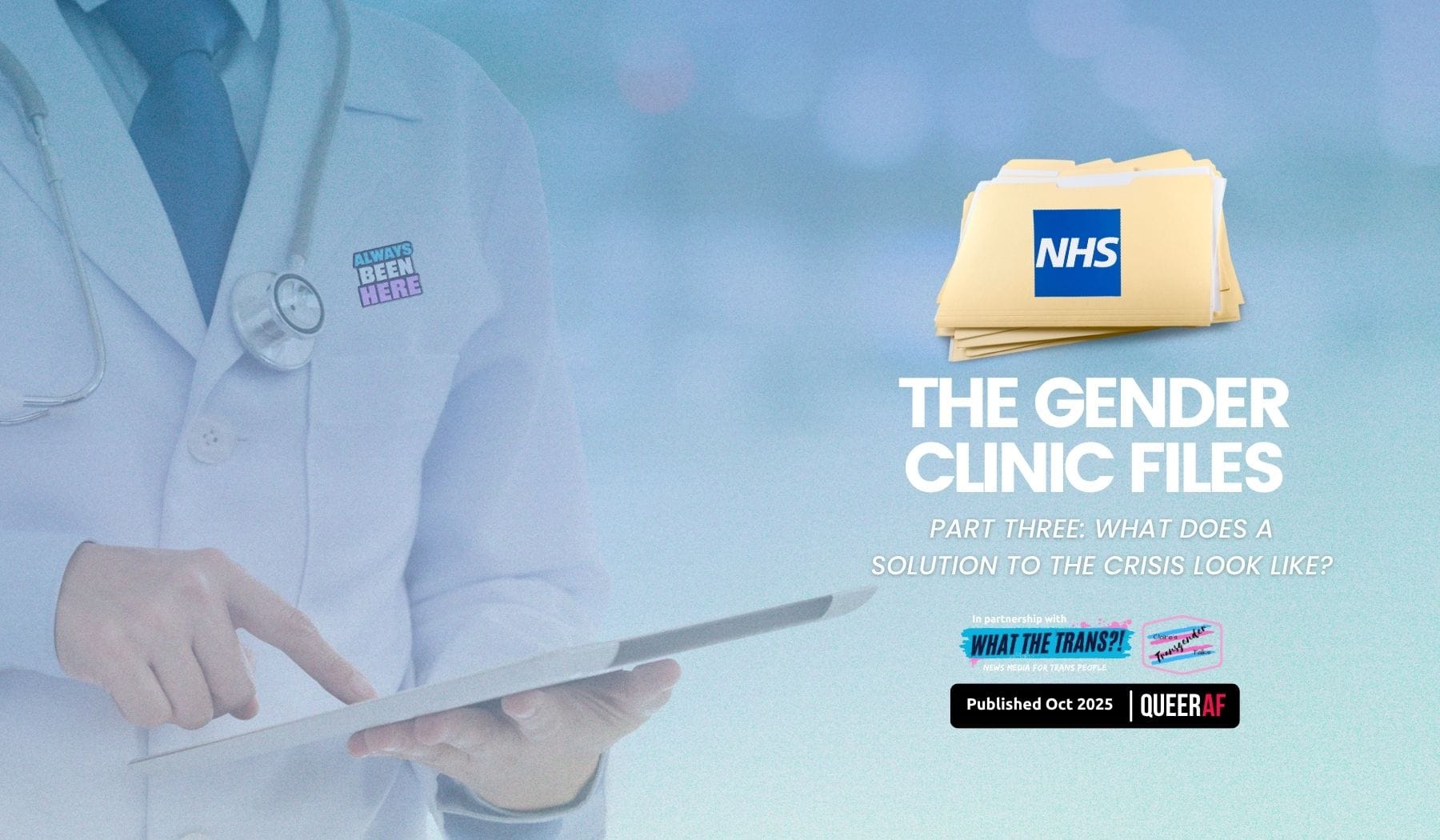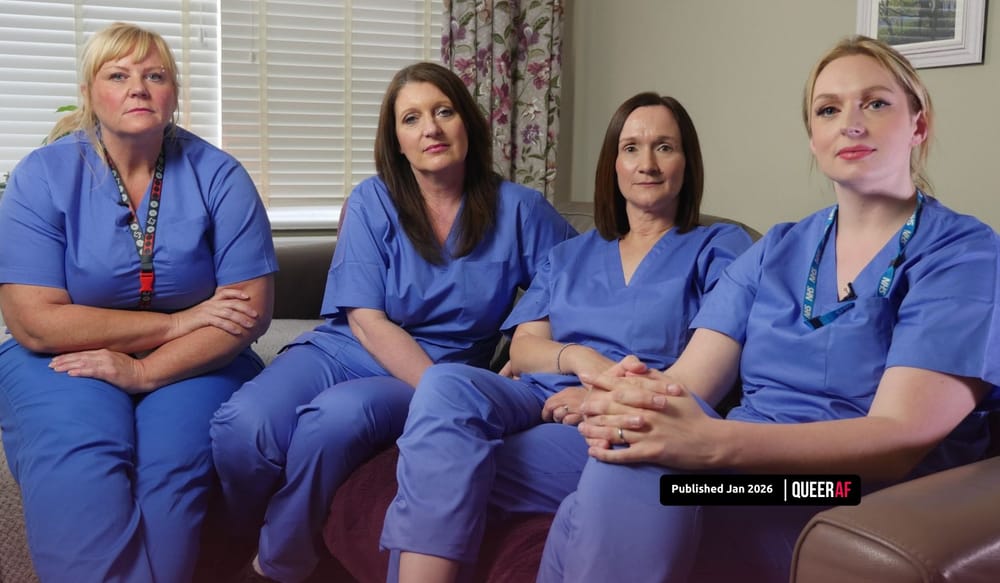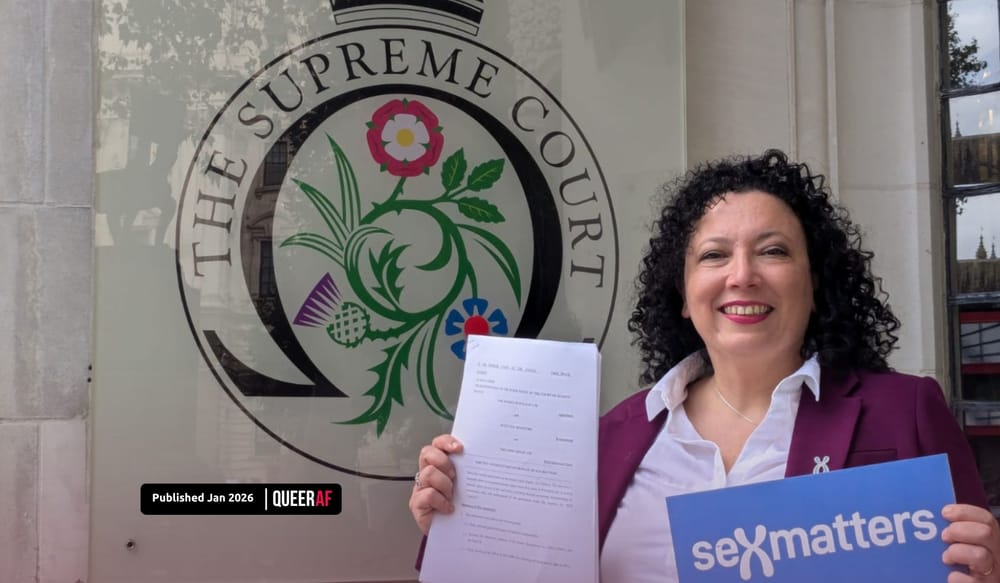
TL;DR: Using data from The Gender Clinic Files, in collaboration with What The Trans?! and Claire’s Trans Talks, QueerAF examines what it would take to reduce the 48,000 people wait list for transgender healthcare in the UK.
It’s now almost impossible for Trans+ people in the UK to access healthcare through NHS gender clinics, according to a rigorous data analysis by QueerAF and What The Trans?!
But what would a system that works look like, and how could it be implemented?
The data, shared in our series The Gender Clinic Files, shows that British gender clinics are catastrophically failing to meet demand, and that their performance has worsened each year since 2019 by almost every available metric.
With the average waiting time for Trans+ healthcare now standing at more than 25 years, young Trans+ people coming out today face waiting until they are in their forties to access NHS gender care. At one Scottish gender clinic in Glasgow, the waiting time for an initial assessment is now 224 years long.
But two clinics have managed to buck this trend: both new gender services, opened as pilots in 2020, that operate under a different model to traditional gender clinics whose diagnostic approach originates in the 1960s. They are TransPlus, based at London’s LGBTQ+ sexual health centre 56 Dean Street, and Indigo Gender Service in Manchester, which is a trans-led service and was designed by and for Trans+ people.
Both TransPlus and Indigo show a dramatically increased level of service compared to the traditional model of gender clinics. While almost every traditional gender clinic in the UK has a waiting time of more than a decade, people referred to TransPlus can expect to wait one year for an initial assessment and those referred to Indigo will wait two.
The new services also offer more appointments with less staff and a lower budget than the traditional gender clinics.
TransPlus, with a budget of £2.6m and 19 clinical staff, conducted 8,906 appointments between 2024 and 2025. Its closest comparison clinic is the gender clinic in Newcastle, which with a higher budget of £2.8m and five more clinical staff conducted less than half that number: 4,428 appointments.
Meanwhile, Indigo’s clinicians offered 4,327 appointments over the course of 2024/25 – similar to Newcastle. Yet Indigo has just 13 clinical staff compared to Newcastle’s 24. While each clinician at Indigo carries out more than 27 appointments each month, at Newcastle, each clinician carries out just over half that, 15 appointments per month.
‘They want to do the best for us that they can’
Physically, both the new services also differ greatly from traditional gender clinics: while the old clinics are often found as units in hospitals or mental health trusts, TransPlus is based in a LGBTQ+ sexual health centre and Indigo’s clinicians provide healthcare through GP clinics across Greater Manchester.
As well as performing better across different data-based metrics than traditional gender clinics, the new gender clinics offer a better experience for those receiving Trans+ healthcare.
Andi*, a trans feminine nonbinary former patient at TransPlus, says that her experience there was “very good in general”.
“TransPlus was proactive in terms of the kind of care that they gave me,” Andi says. “Every step of the way, TransPlus was very open to my care needs. The nurses, especially, were always just amazing. They're really lovely to talk to.”
Indigo, Manchester – the only trans-led gender clinic in the UK – is the other new service that is performing well. Alec, a trans man who is a patient at Indigo, has had a more mixed experience, finding the clinic at times appears disorganised, with staff seeming stretched and occasionally forgetting to carry out certain health checks, like checking his blood pressure.
Alec also said he would’ve appreciated it if Indigo gave clearer instructions to his GP about the timing of his testosterone injections and blood monitoring, because he had a “confusing” time trying to work this out with his GP.
But overall, he is positive about his experience at Indigo, and says the big plus of the clinic is its “willingness to actually help us get what we’ve come there for”.
“The time scales are still not amazing, but they do want to do the best for us that they can, you can tell that,” Alec says. “And there's no judgment. There are queer people who work there. It feels like you're going there for trans healthcare and you're going to walk out with it.”
How can we fix the transgender healthcare crisis?
Looking at TransPlus and Indigo, it’s clear that these new versions of gender clinics give Trans+ people better access to healthcare than the traditional models. It’s much quicker to get an appointment and a more comfortable experience.
The data shows us that to clear the existing waiting list of more than 48,000 people, the UK would need another 83 clinics offering the same level of performance in service as Indigo in Manchester.
In a hypothetical world in which there was the political will to fund and open dozens of new gender clinics, the question is: Where would be the best place to open them?
Currently, the geographic spread of gender clinics is unequal across the UK. This means that Trans+ people in rural areas, or areas served by only one gender clinic, have a harder time receiving healthcare.
“When you live somewhere like Cornwall, the only gender clinic nearby is Exeter and it has such terrible waiting lists,” Juliet Paige, director of Plymouth Pride tells QueerAF. “A lot of people struggle to get to Nottingham or London or to any other clinics, and when we see that they open these new clinics but in Manchester or Brighton – it’s just so far away and inaccessible to a lot of people.”
Juliet adds that some people do travel the seven or so hours it takes from the south-west to get to a gender clinic that isn’t Exeter, but that this is “another burden”.
“It feels like everything is being made to be more difficult for trans people at the moment,” she says.
Looking at the map, we can see that new clinics in the style of TransPlus or Indigo would ideally be opened in the south-west of England, the north-west, East Anglia, and the West Midlands.
There would also be another clinic in Northern Ireland, where the Trans+ population is currently served by just one gender clinic. While Wales also has just one gender service, with its wait time of two years for an initial assessment, it appears to be coping with demand.
Scotland currently has the most gender clinics for its Trans+ population of all the nations in the UK, but with the recent collapse of the gender clinic in Glasgow, there is an argument for opening another new clinic there.
Ultimately, though, even with all the gender clinics in the world, the issue still remains that gender clinics exist to pathologise being transgender – and many Trans+ people believe that healthcare would be improved without them.
Analysis: Time to abolish gender clinics?
Opening more clinics like TransPlus and Indigo could clear the waiting lists and ensure that Trans+ people waiting now receive the healthcare they need in a timely manner. But it doesn’t fix the broader issue: Gender clinics create the bottlenecks for treatment.
While opening dozens of new gender clinics following the model of TransPlus and Indigo would help in the short term, the problem still remains that Trans+ people have to go through a segregated healthcare system to access healthcare that in most cases is also being used by people who aren’t trans – and who aren’t forced to go through a gender clinic or be diagnosed with a psychiatric condition in order to access it.
As Juliet succinctly summarises: “GPs are happy to prescribe hormones to cis women. So why are they not happy to prescribe them for trans women?”

This investigative series which is being published first in our newsletter and running every Saturday, October 2025, quickly became highly anticipated.
"Important journalism dropping this weekend from @wearequeeraf.com. If you can afford to, taking out a subscription will help the amazing team tell more of their brilliant in-depth stories, the ones that mainstream media won’t touch." - Alice Litman's mother, author of Her Name Is Alice, Caroline Litman
We hope it will become a useful tool for everyone to advocate for the healthcare they deserve.
"Support QueerAF’s important investigative work. This work costs, and we need even more of it." - Founder of Trans+ History Week, Marty Davies
Information is a tool for liberation, and we need your help to deliver our investigations - free from ads, or outside pressures.
"Trans people deserve an outlet that doesn't qualify or negotiate their existence - and QueerAF celebrates trans lives, without condition." - Founder of Good Law Project, Jolyon Maugham
It likely goes without saying all of this journalism and investment in talent costs a great deal.
Luckily, as the UK's only press-regulated and not-for-profit LGBTQIA+ publisher, we're well-placed to ensure every penny is put towards our long-term mission to change the media. So please, if you found this article valuable:










